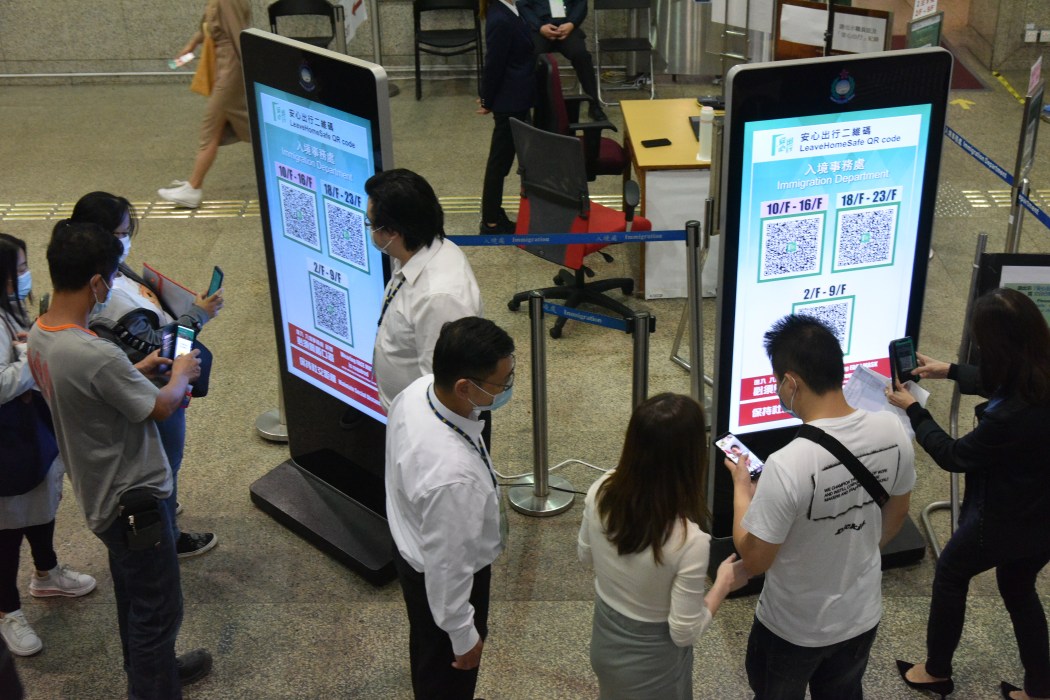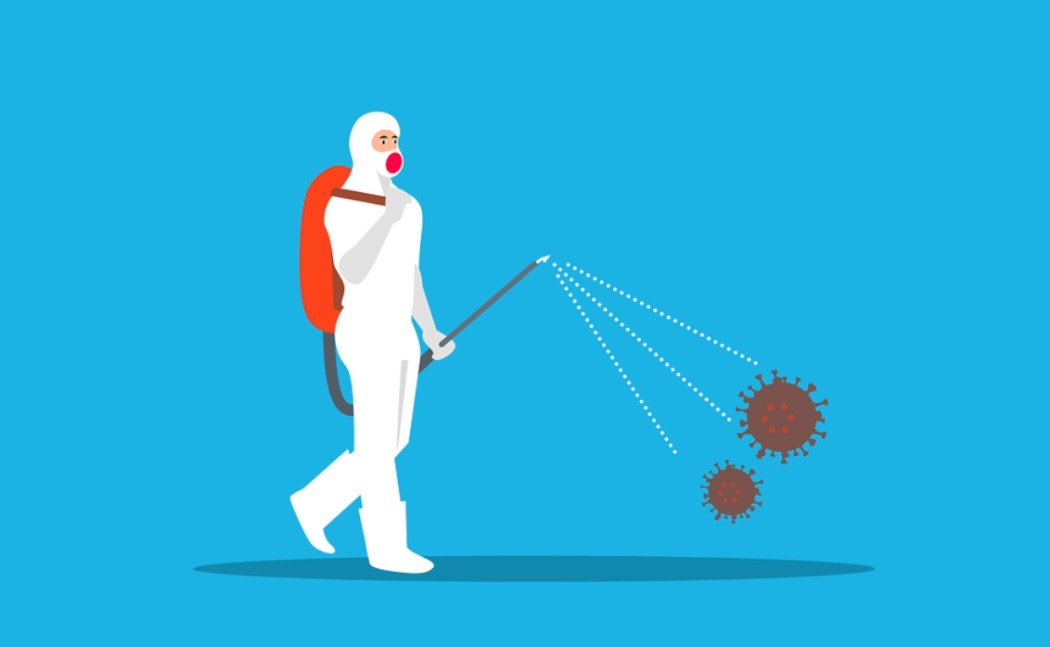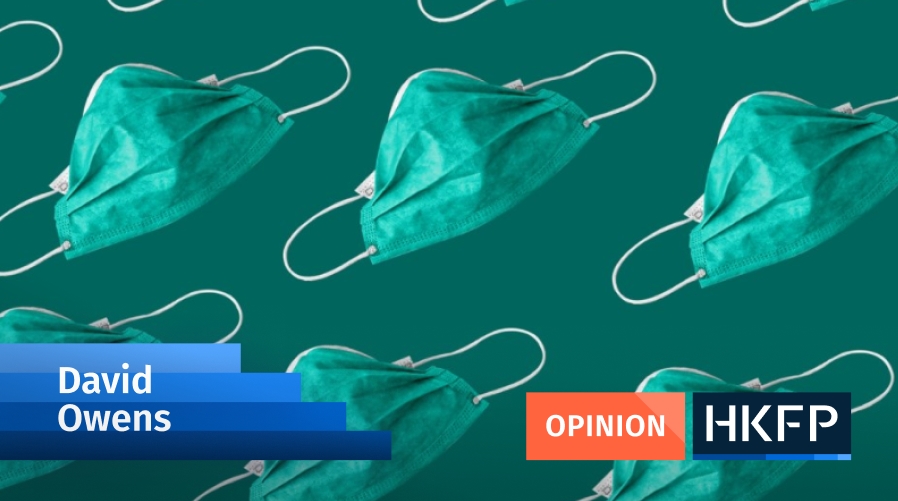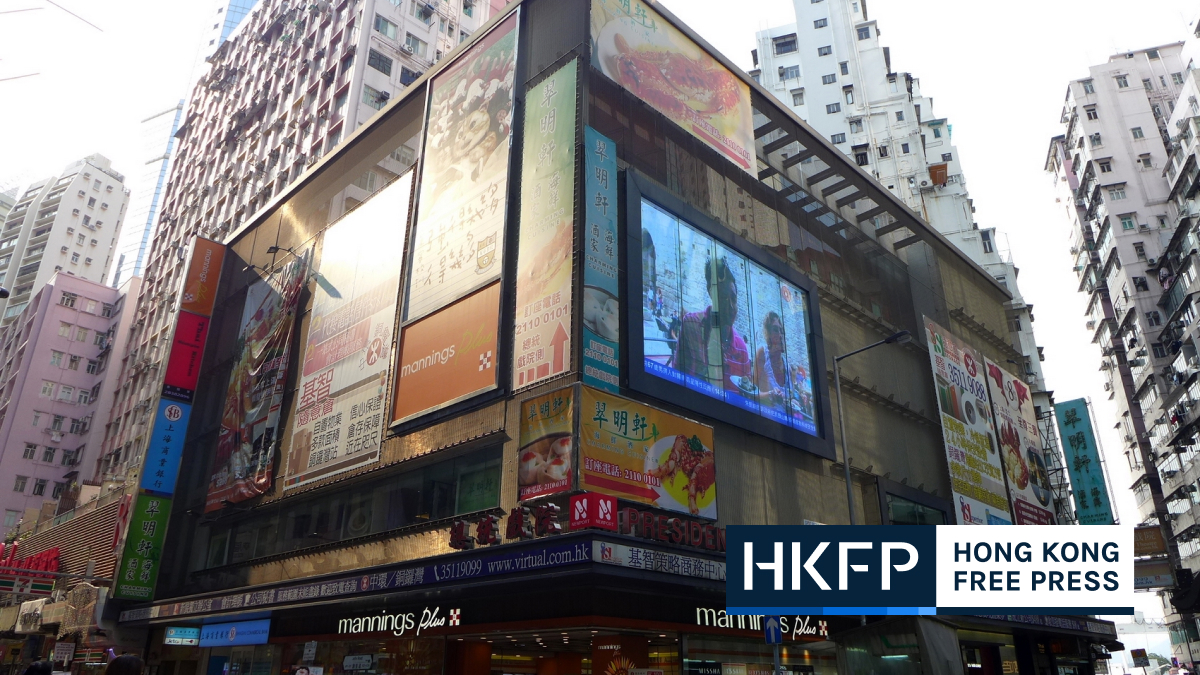Hong Kong no longer requires residents to scan a QR code using the Covid-19 LeaveHomeSafe app to enter restaurants and other businesses. Additionally, arrivals to the city – who were previously barred from entering certain premises including bars and eateries within their first three days in Hong Kong – are not subject to any such restrictions.
Chief Executive John Lee said on Tuesday that the adjustments were based on data, risk assessment and the “actual situation.” The relaxations come as China rapidly eases anti-epidemic rules in the wake of multi-city protests against almost three years of strict zero-Covid restrictions.

Restrictions in Hong Kong, however, remain stricter than in some areas of China, and arrivals still face multiple Covid-19 tests and bureaucracy that has been scrapped almost everywhere else. The city’s health chief has said Covid policy will not “hastily follow” the mainland’s.
HKFP reviews what restrictions remain, as of December 14, 2022.
Masks in public, 24/7
Unlike in much of China, masks must still be worn in public places – including outside, in shops and on public transport – or residents risk a fixed penalty of HK$5,000. The government has allowed exemptions for those exercising outdoors or in gyms and sports venues, but not for smokers.
The city’s leader has indicated that face coverings are here to stay: “Masks will stay on because I think all experts have indicated masks [are] important to control the spread of the disease,” Lee said last month. But some experts, such as epidemiologist Ben Cowling, have said there is little scientific reason for the requirement at this stage in the pandemic.

Group gathering ban
Gatherings of more than 12 people are banned in public places. Groups must also remain at least 1.5 metres apart. Local tour groups are limited to 30 people, or 100 people if all tourists have undergone a rapid test. Violators face a HK$5,000 fixed penalty.
Vaccine Pass requirement for key venues
Since February 24, residents must show proof of vaccination to enter venues such as supermarkets, malls, schools, government offices and hospitals.
Currently, those aged 12 and above must have had at least three doses of a Covid vaccination – or two if they received their second jab less than five months prior.

Children aged five to 11 are required to have received two doses, or one if they had their first dose within the past three months.
Regulated Vaccine Pass premises – click to view
| Venues | Presentation of proof of vaccination QR code upon entry / upon request by law enforcement |
| Restaurants & bars | upon entry |
| Supermarkets | upon request |
| Markets | upon request |
| Shopping malls | upon request |
| Department stores | upon request |
| Club houses | upon entry |
| Gyms | upon entry |
| Sports premises | upon entry |
| Swimming Pools | upon entry |
| Places of public entertainment (e.g. cinemas & theatres) | upon entry |
| Beauty parlours | upon entry |
| Hair salons | upon entry |
| Massage parlours | upon entry |
| Event premises | upon entry |
| Party rooms | upon entry |
| Nightclubs | upon entry |
| Places of amusement (e.g. ice skating rinks) | upon entry |
| Religious venues | upon entry |
| Bathhouses | upon entry |
| Cruise ships | upon entry |
| Karaoke establishments | upon entry |
| Mahjong houses | upon entry |
| Hotels (staff only) | upon entry |
| Amusement game centres | upon entry |
| Public hospitals | not required |
| Government premises | not required |
Eight Covid tests for arrivals
Visitors to Hong Kong must fill in a government health declaration form and show a negative rapid test prior to boarding a flight. Non-residents must be vaccinated in order to enter. Some airlines also impose additional requirements.
Arrivals must perform daily rapid tests for five days, and take two PCR tests: one upon arrival, which is considered day “zero”, and again on their second day in the city.
If any tests return positive results, the visitor will be served with an isolation order. Depending on their living circumstances, they may be forced to go to a government quarantine camp.
Restaurant restrictions
Only 12 people are allowed on each table at restaurants, with screens or distancing still imposed to allow space between groups.
The same limits apply to groups at swimming pools, sports premises, fitness centres, beauty parlours and massage establishments, places of public entertainment, places of amusement, amusement game centres, event premises, religious premises, barber shops/hair salons, bathhouses, party rooms, clubs and nightclubs, karaoke venues, mahjong premises and cruise ships.

At catering premises, when diners are away from a table, they must not consume food or drink and must wear a mask. Proof of vaccination is required to enter all eateries.
Up to 240 people may attend a banquet, though they must undergo and show proof of having taken a rapid test within 24 hours.
Restrictions on bars and clubs
Those wishing to enter bars or nightclubs must show a photo of a negative result from a rapid test performed in the past 24-hours with their name written on it, as well as the time and date it was taken.
Up to six people are allowed per table, and venues may only fill up to 75 per cent capacity. When revellers at bars are away from a table, they must not consume food or drink and must wear a mask – including when dancing.
Eating/drinking ban on public transport
Eating and drinking is to remain banned on Hong Kong public transport, the Health Bureau confirmed to HKFP last month. The department said that the rules were “science-based and targeted.” While consuming food and drink was always banned in paid areas of the MTR, it was previously allowed on many ferry routes.
Event restrictions
Various restrictions have been imposed on recent public events, while some have failed to gain approval altogether. The Hong Kong Marathon was axed, and then rescheduled for next February. The cross-harbour swim was allowed to take place, but limited to 1,500 swimmers.
Meanwhile, restrictions have been placed on sporting events. Last month, the government gave approval to a trail run, but said that snacks like bananas may only be consumed silently in certain areas, and only if runners are alone.
Police powers and fines
Police retain special powers to disperse illegal group gatherings and demand personal details and ID cards of those suspected of violating Covid rules. They can also inspect restricted premises and impose penalties.
Other authorised officers – such as those from the Agriculture, Fisheries and Conservation Department and Food and Environmental Hygiene Department – are also empowered to impose fines.
Restricted capacity at leisure facilities
Public swimming pools may only welcome swimmers up to 50 per cent of their capacity, whilst the capacity of other outdoor venues is also limited, including in spectator stands.

Water fountains closed
Water dispensers at all public leisure grounds have been suspended since January 29, 2020, and remain taped up.
Frequent Covid testing for key workers
Teachers, healthcare workers, care home staff, musicians at live music venues and catering staff are among those who must undergo regular Covid tests.
Other venue restrictions
Cinemas, performance venues, museums, event premises and religious premises may only fill their premises up to 85 per cent capacity.
School restrictions
All Hong Kong students must take daily rapid tests to enter school grounds.
Full-day in-person classes were suspended for primary and secondary students in August 2020.
Secondary and primary schools must achieve a 70 per cent double-vaccination rate among pupils before they can apply to resume full-day classes or offer after-school extracurricular activities.
There are currently no plans to resume full-day teaching at kindergarten level.
Mainland medics allowed in
In February, the government invoked emergency powers to allow in doctors and nurses from the mainland to help tackle the fifth wave of Covid-19.
Quarantine for infected persons
Depending on the severity of symptoms, those who report a positive test result to the government may be sent to hospital, a community isolation facility, or may be allowed to isolate at home.
Under new rules announced in December, patients and close contacts – regardless of their vaccination status – will be able to complete a five-day minimum isolation period if they test negative on rapid antigen tests on the fourth and fifth day
Household close contacts of infected people may also undergo home quarantine. However, those who live in subdivided flats, or do not have a functional flushing toilet or hand washing facility, or who live with high-risk individuals, may not be allowed to isolate at home.
Local mandatory testing
Those residing in areas of an outbreak defined by the government can be made to undergo a compulsory Covid-19 PCR test. Fixed penalties of HK$10,000 are imposed on those who fail to undergo a test.
Support HKFP | Policies & Ethics | Error/typo? | Contact Us | Newsletter | Transparency & Annual Report | Apps
Help safeguard press freedom & keep HKFP free for all readers by supporting our team















